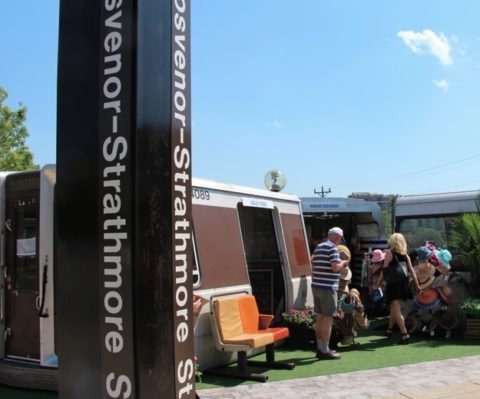
OCT. 23, 2018 | Written by Dan Schere | BETHESDA BEAT
Daily riders of Metro’s Red Line who use four Montgomery County stations will be in for a faster commute starting in December, thanks to the elimination of train turnbacks at the Grosvenor-Strathmore station.
Metro General Manager Paul Wiedefeld told the Montgomery County Council at its meeting on Tuesday that starting Dec. 17, all trains heading out of Washington, D.C., and into the Maryland suburbs will continue on to White Flint, Twinbrook, Rockville and Shady Grove.
According to a press release, the elimination of the turnbacks will double rush-hour service, which means there will be trains every four minutes at the four stations north of Grosvenor.
Metro implemented the turnbacks in 1984 to help deal with a shortage of railcars, with the board voting in 2015 to end the turnbacks by this summer. Since then, Metro has added 583 of its new 7000-series cars, with another 183 scheduled to be added next year, according to The Washington Post. County officials, including County Executive Ike Leggett, wrote to Metro earlier this year requesting that the transit agency end the turnbacks because they were resulting in fewer trains for riders between Shady Grove and White Flint, and decreased ridership overall on that portion of the line. Shady Grove is the second-busiest station in Montgomery County with 11,517 average weekday boardings, according to the press release. Silver Spring is the county’s busiest station, with 12,004.
Trains on the other end of the Red Line will continue to turn around at Silver Spring, with no immediate plans to increase the number of northbound trains to the Forest Glen, Wheaton and Glenmont stations, Metro spokeswoman Sherri Ly said.
“Any additional service changes would need to be considered by the Metro Board as part of the [fiscal year 2020] budget process,” she wrote in an email.
Metro board member Michael Goldman, who represents Montgomery County’s interests, said he made the request to end the turnbacks on behalf of Leggett, Rockville and Gaithersburg mayors Bridget Donnell Newton and Jud Ashman, respectively, and other members of the County Council.
Goldman said he pushed for improvements to the Red Line in 2015 after Virginia increased its share of Metro funding for upgrades on the Orange and Blue Lines.
“I said, if we’re going to meet the needs in Virginia, this is a good time to end the turnbacks at Grosvenor,” he said in an interview.
Goldman said the timing for the end of the turnbacks is such that the remainder of the 7000 series railcars will be delivered when the turnbacks end. Another set of railcars, known as the 8000 series, will be delivered around 2023.
Goldman added the benefit of having more trains running between Shady Grove and Grosvenor will mean less commuters from the upcounty will be driving on Rockville Pike to get to Grosvenor.
“The ending of the Grosvenor turnbacks isn’t just a benefit for riders, but it has benefits for drivers on Rockville Pike in terms of relieving traffic congestion,” he said.
During Tuesday’s presentation to the council, Wiedefeld also announced several other improvements coming to Metro in 2019, including a new stairway at Shady Grove and better cell phone reception inside tunnels.
Wiedefeld said the improvements were possible largely due to the spring agreement between Maryland, Virginia and the District of Columbia to provide a total of $500 million per year in dedicated funding to help Metro with its capital improvements. Maryland agreed to provide $167 million per year.
“This project would not have been possible without the commitment to providing a dedicated source of funding for our capital program, and I want to thank our elected leaders throughout the region for making it possible,” Wiedefeld wrote in the press release.
During Tuesday’s council hearing, Wiedefeld said there were no current plans to restore late night service. He said that 15-minute headways during nonpeak times sounded realistic in the future in response to a question from council President Hans Riemer, and also told council member Roger Berliner that he was open to allowing retailers to set up shop outside Metro stations, just not inside.
Riemer, during his weekly press conference Monday, said that in addition to lobbying Metro to maintain its riders advisory committee, the county would be setting up its own in the future.
Dan Schere can be reached at Daniel.schere@bethesdamagazine.com